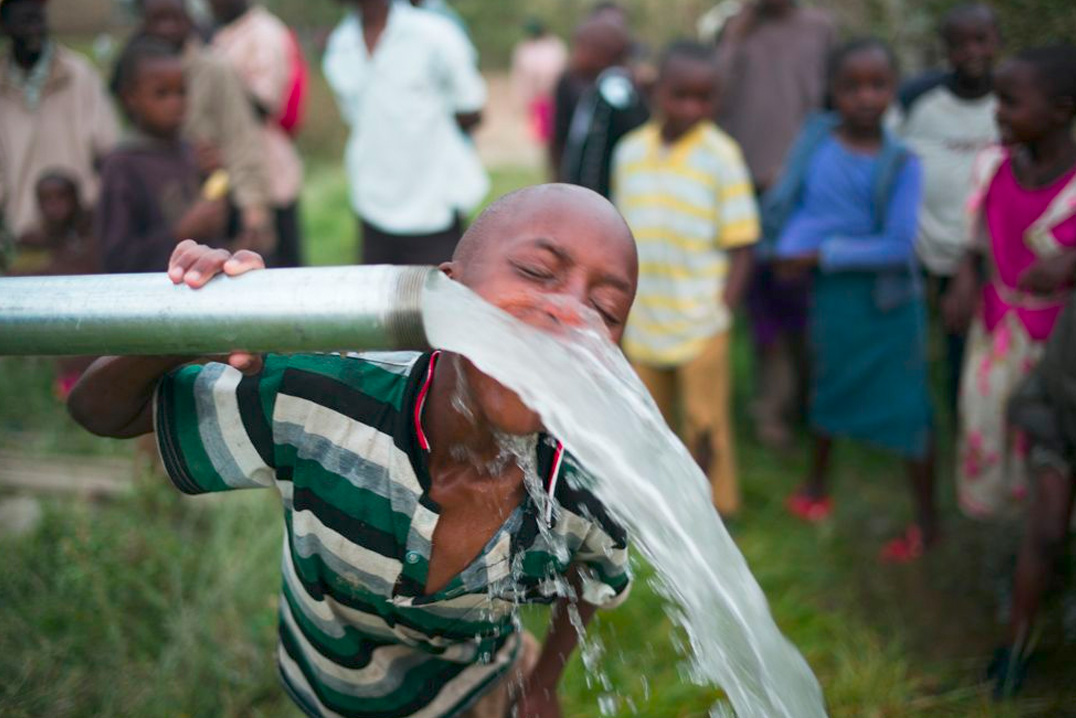The Ripple Effect
Our clean water systems trigger a Ripple Effect of impact and become long-term anchors for community prosperity.
Our clean water systems trigger a Ripple Effect of impact and become long-term anchors for community prosperity.
The answer might seem obvious because water is such an essential part of our daily lives, but the impact of clean water in developing regions is profound and goes way beyond the water well.
Well Aware’s clean water systems trigger a Ripple Effect within our partner communities. Diseases plummet, education increases, gender equality improves, agriculture and commerce grow, and reinvestment in the community increases. In short, reliable access to clean water enables stability and growth and allows communities to thrive.

Reliable access to clean water, along with better sanitation and hygiene practices, causes rates for waterborne illnesses, like cholera, to plummet and drastically improves the health of communities.
With a reliable source of clean water nearby, children can focus on school instead of walking long ways to collect water. And, with better clean water infrastructure in schools for toilets and handwashing, girls don’t have to drop out at puberty due to not having a place to wash.
Educated girls earn higher incomes, are less likely to marry early, and are empowered to build better futures for themselves and their families. When women no longer spend their days fetching water, they can secure greater job opportunities and a stronger voice within their communities.
With enough water, communities can plant more crops and diversify their income. This creates new jobs, stabilizes nutrition, and can allow a community to become more self-reliant.
Less time spent worrying about water means more time spent on economic activity. More money is circulated within the economy as incomes diversify and jobs grow.
Reliable access to clean water can reduce tension and conflict over resources. People congregate and communities grow around clean water systems. Clean water becomes a long-term anchor for community prosperity — enabling entire communities and future generations to thrive, grow, and develop.
Reliable access to clean water, along with better sanitation and hygiene practices, causes rates for waterborne illnesses, like cholera, to plummet and drastically improves the health of communities.
With a reliable source of clean water nearby, children can focus on school instead of walking long ways to collect water. And, with better clean water infrastructure in schools for toilets and handwashing, girls don’t have to drop out at puberty due to not having a place to wash.
Educated girls earn higher incomes, are less likely to marry early, and are empowered to build better futures for themselves and their families. When women no longer spend their days fetching water, they can secure greater job opportunities and a stronger voice within their communities.
With enough water, communities can plant more crops and diversify their income. This creates new jobs, stabilizes nutrition, and can allow a community to become more self-reliant.
Less time spent worrying about water means more time spent on economic activity. More money is circulated within the economy as incomes diversify and jobs grow.
Reliable access to clean water can reduce tension and conflict over resources. People congregate and communities grow around clean water systems. Clean water becomes a long-term anchor for community prosperity — enabling entire communities and future generations to thrive, grow, and develop.
Reliable access to clean water, along with better sanitation and hygiene practices, causes rates for waterborne illnesses, like cholera, to plummet and drastically improves the health of communities.
With a reliable source of clean water nearby, children can focus on school instead of walking long ways to collect water. And, with better clean water infrastructure in schools for toilets and handwashing, girls don’t have to drop out at puberty due to not having a place to wash.
Educated girls earn higher incomes, are less likely to marry early, and are empowered to build better futures for themselves and their families. When women no longer spend their days fetching water, they can secure greater job opportunities and a stronger voice within their communities.
With enough water, communities can plant more crops and diversify their income. This creates new jobs, stabilizes nutrition, and can allow a community to become more self-reliant.
Less time spent worrying about water means more time spent on economic activity. More money is circulated within the economy as incomes diversify and jobs grow.
Reliable access to clean water can reduce tension and conflict over resources. People congregate and communities grow around clean water systems. Clean water becomes a long-term anchor for community prosperity — enabling entire communities and future generations to thrive, grow, and develop.